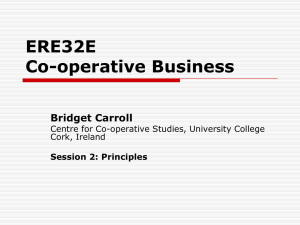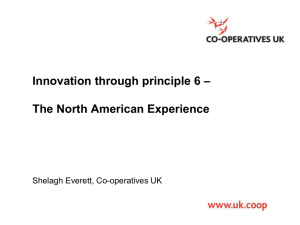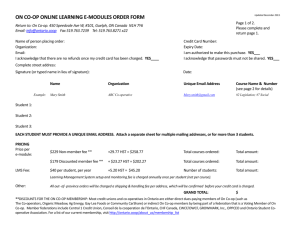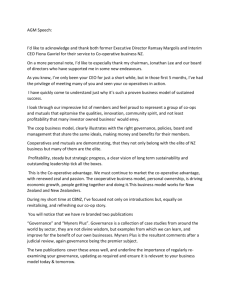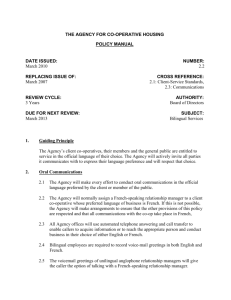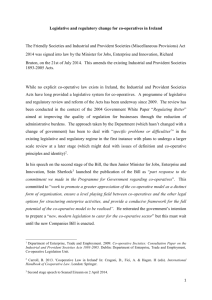November - Centre for the Study of Co
advertisement
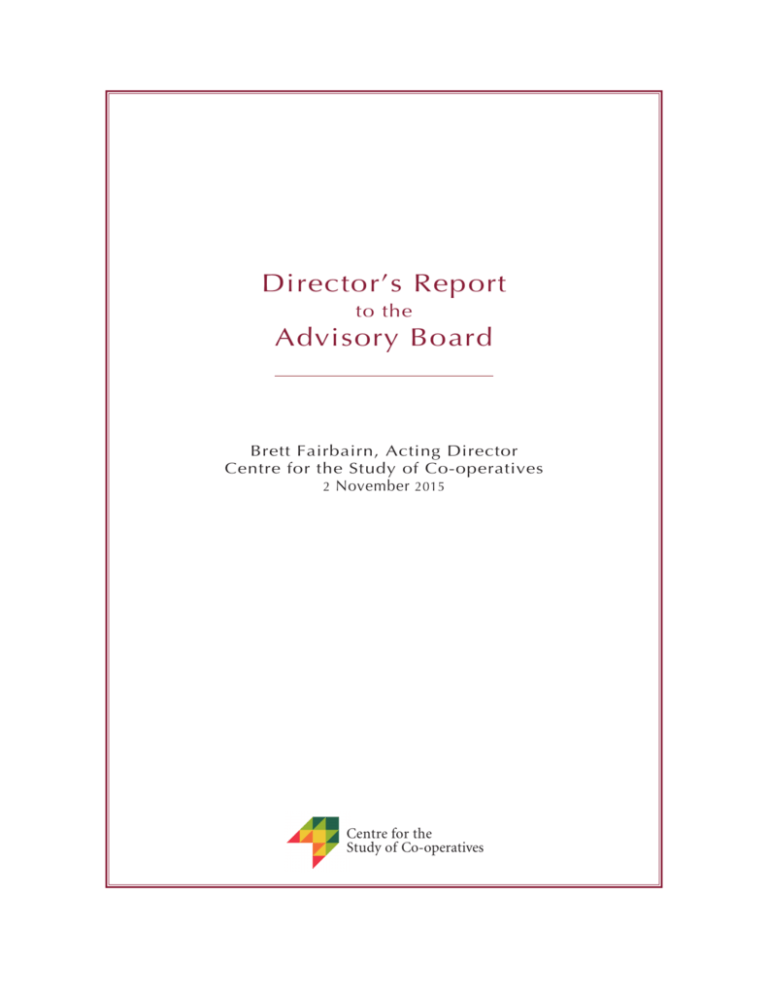
Director’s Report to the Advisory Board Brett Fairbairn, Acting Director Centre for the Study of Co-operatives 2 November 2015 Centre for the Study of Co-operatives s The Centre for the Study of Co-operatives is an interdisciplinary teaching and research institution located on the University of Saskatchewan campus in Saskatoon. Contract partners in the co-operative sector include Saskatchewan Credit Unions, Federated Co-operatives Ltd., Concentra Financial, The Co-operators, and CHS Inc. The centre is also supported by the University of Saskatchewan. The university not only houses our offices but provides in-kind contributions from a number of departments and units as well as financial assistance with operations and nonsalary expenditures. We acknowledge with gratitude the ongoing support of all our partner organizations. s s s Highlights of Centre Activities June – November 2015 A New Approach to the Director’s Report s Update on the Strategic Plan s Thematic Breakdown of Centre Activity Governance Co-operative Development Rural and Agricultural Indigenous s Research Projects and Funding s Teaching, Administration, Professional Activities s Appendix Awards for Sponsors The MacPherson Talks — A New Seminar Series Faculty/Scholar/Staff/Student News Detailed Summary of Centre Activities Research Centre Publications Faculty Publications Presentations Conferences, Workshops, Meetings Seminar Series s s A New Approach to the Director’s Report After consultation with board members, and with a view to making it easier for readers to find subject matter of particular interest to them, we are taking a new approach to the organization of the director’s report. Material that used to appear itemized under the names of individual faculty members will now be grouped under four broad thematic headings: governance, co-op development, rural and agricultural, and Indigenous. These broad themes include a number of subthemes, itemized with each main heading, which will further clarify the content below. There is some duplication as some items belong under more than one category. We have provided a list of research projects funded by outside sources so readers can see at a glance the additonal funds leveraged by individual faculty members. Since this new approach will not capture all the work being done by Centre faculty, we have included an appendix that provides a more comprehensive, but not exhaustive, list of teaching, research, presentations, seminars, and publications activities to which readers can refer for further reference. This also contributes to preserving the institutional memory of the organization. This is a first attempt to simplify the large volume of information generated by the activities of Centre faculty, scholars, students, and staff and make it more accessible to readers . It will evolve over time to meet the needs of the management advisory board and our other stakeholders. s Update on the Strategic Plan The document in the board package titled Strategic Planning was produced by our facilitators Vince Bruni-Bossio and Brooke Klassen, who have given us a synthesis of the discussions as they heard them. Brett will be using these discussions as a guide to the Centre’s work this year. We are looking for input from the advisory board as to the next stages in our strategic planning. A number of clear messages came out of the March meeting. Among these were three directly related to our partner organizations. They would like to see research on the impacts of co-operatives on communities; they would like us to develop a process for responding to requests from the sector; and they would like us to investigate methods to translate research results into information and knowledge the sector can use and apply. In other words, the Centre needs a formal strategy to communicate the value of the co-operative model to stakeholders and the broader public. In pursuit of this, the plan sets out a number of strategic goals, which are outlined below, together with a brief comment on our accomplishments in each area since the March planning session. 4 s DIRECTOR’S REPORT NOVEMBER 2015 s CENTRE FOR THE STUDY OF CO-OPERATIVES s Research — we need to develop further capacity; to focus in key areas where we have adequate capacity and resources (governance, community/co-op building, sustainability); to be recognized as a sought-after resource centre in the academic and co-op sector communities. We have developed four broad thematic areas that reflect our current expertise and will also stretch our capacity as we move forward: governance, co-op development, rural and agricultural, and Indigenous. s Education — we need to engage students and the co-op sector in experiential learning and research; to be a source of co-operative material that can be integrated into courses across a wide variety of disciplines using a variety of delivery methods. We have a number of videos based on seminar presentations that cover a wide variety of co-op topics; we have two new co-op courses, one of which is based on experiential learning; we are working with the Ivey School of Business to develop co-op case studies for use in classes around the world; and we are developing a blendeddelivery version of our Graduate Certificate in the Social Economy and Co-operatives to make it accessible to students across all disciplines anywhere in the world. s Engagement and Communications — we need to expose a wider audience to the co-op model; to develop a strategic intermediary/translation function; to align our partnership base with the mandate of the Centre; to develop a mutually beneficial exchange between the Centre and its sponsors. We launched a new seminar series this fall —The MacPherson Talks. The Centre is proud to have been chosen as the home for what will be an annual presentation in honour of the late Dr. Ian MacPherson, one of the leading lights of the international co-operative movement. The inaugural presentation, “Rethinking the Economics of Co-operatives,” by Carlo Borzaga, president of the European Research Institute on Co-operatives and Social Enterprises in Trento, Italy, took place 15 September 2015 in the Diefenbaker Building. The seminar was live streamed and also appears on the home page of our website. Acting Director Brett Fairbairn is working on a Top Co-op Issues initiative that will canvas sector leaders across the country to determine the most critical challenges currently facing the sector. Survey results will be synthesized, analyzed, and disseminated to stakeholders. Brett has also initiated a plan to conduct outreach with a variety of co-op organizations and boards. s Thematic Breakdown of Selected Centre Activity The Centre for the Study of Co-operatives has at the core of its mission the creation of new knowledge about co-operatives. New knowledge is created in the minds of people: faculty, students, officials of co-operatives and the public sector, and others, who experience our events, activities, and initiatives in person and through various media. The Centre’s discovery mission is currently concentrated in the areas of co-operative governance, co-operative development, rural and agricultural communities, and Indigenous co-operation. The following sections provide more depth on these four areas. 5 s DIRECTOR’S REPORT NOVEMBER 2015 s CENTRE FOR THE STUDY OF CO-OPERATIVES Governance g including co-operative theory, demutualization, leadership, management, community and social engagement (member or stakeholder voice), and policy Governance is a critical determinant of the success or failure of organizations. Informed by the study of co-operatives and their distinctive issues, the Centre is producing a new synthesis of knowledge and theory about governance. This involves three elements: developing governance and organizational theory and publishing it in international forums to influence scholars and students of governance; applying theory to co-operatives and providing leaders with new insights into governance; and conducting case studies of co-operative governance. The Centre’s emerging approach views governance as the allocation of power within organizations and among stakeholders — governance is a basic question of the purpose of an organization and how it is conceptualized. Allocation of power through governance enables organizations to address three fundamental categories of problems: strategic interdependencies among stakeholders (co-operation and co-ordination among members, directors, managers, etc.); establishing a shared way of thinking to deal with an uncertain future; and maintaining legitimacy. s s s s s s s s 6 “Demutualization of Co-operatives and Mutuals,” Murray Fulton and Jean-Pierre Girard; report for Co-operatives and Mutuals Canada; completed; shows how cases of co-operative demutualizations frequently have their roots in failures to resolve key problems of governance “Governance and Managerial Effort in Consumer-Owned Enterprises,” article by Murray Fulton and Dionne Pohler; European Review of Agricultural Economics; accepted for publication; applies the Centre’s emerging understanding of governance to provide a better explanation of incentives for managers to strive to serve member goals “Governance of Co-operative Federations: Principles and a Framework for Research,” Brett Fairbairn, Murray Fulton, and Dionne Pohler; article in preparation for submission to a peer-reviewed journal; reviews governance literature and uses key governance concepts to highlight expected governance problems and possible solutions in federated organizations “The Governance of Federations,” Murray Fulton, Dionne Pohler, and Brett Fairbairn; article in preparation for submission to a peer-reviewed journal; introduction to key governance concepts, to be used as a framework for future case studies and specialized research “University Leadership: Development Paths and Networks,” leadership development program for senior university leaders in collaboration with the Conference Board of Canada; Brett Fairbairn; program to be launched in 2016 “Members, Managers, and Labour: Addressing Unexamined Tensions in Agricultural Co-operatives,” presentation by Michael Gertler at the meetings of the Rural Agricultural Society, Madison, WI, August 2015 “Understanding Income Inequality with a Socio-Political Economy Model of Organizational Governance,” presentation by Dionne Pohler and Murray Fulton at the Academy of Management Conference, Vancouver, August 2015 “Governance and the Political Economy of Co-operatives,” presentation by s DIRECTOR’S REPORT NOVEMBER 2015 s CENTRE FOR THE STUDY OF CO-OPERATIVES Murray Fulton to the Business and Economics Group, Inner Mongolia Agricultural University, Hohhut, Inner Mongolia, August 2015 Ongoing work in this area G “Towards a General Model of Organizational Governance,” Michael Atkinson, Murray Fulton, and Dionne Pohler; working paper; ongoing G “The Impact of Strategic Management and Balanced Scorecards on the Performance of Public Sector Organizations,” C. Riddell and Dionne Pohler; ongoing research, data collection underway G “Leadership, Innovation, and Cultural Change at Federated Co-operatives Limited and in the Co-operative Retailing System,” book-length manuscript; Brett Fairbairn, ongoing research G theory and case studies of governance and innovation in co-operatives; Brett Fairbairn, ongoing research Co-operative Development g including community and social engagement, measurement of impact, ethics, history, innovation, sustainability The development of new co-operatives is a complex and sometimes mysterious process, and one that in the long run is important for the renewal of the co-operative sector. The teachings and lore of the co-operative movement indicate that co-ops are formed by voluntary associations of people, usually at a local level, who want to address a need by forming an enterprise. At the same time, history shows that co-ops do not emerge everywhere they could, but in patterns and clusters — often connected with a citizens’ or social movement, sponsorship by pre-existing co-operatives, and/or action by the state. Some thrive more than others. The Centre discovers new knowledge about co-op development, and creates learning opportunities for students and leaders, by exploring how different factors work together to produce successful co-op development. The Centre’s approach involves a strong focus on understanding community needs, capacity, and leadership, and on identifying the specific kinds of interventions that can promote self-help. We look for the best, proven insights from around the world and for ways these can be adapted and applied in Canada and elsewhere. The Co-operative Innovation Project (CIP), our most significant current undertaking, is investigating co-operative business development in rural and Aboriginal communities in Canada. Funded with $1 million from Federated Co-operatives Limited (FCL), on behalf of the Co-operative Retailing system, the project is providing a unique opportunity to help rural and Aboriginal communities determine whether the co-op model can be applied as a practical solution to needs identified by the communities themselves. The project hopes to inspire innovation and economic development, and create lasting changes based on co-op principles such as co-operation, participation, and concern for the community. CIP personnel have made more than thirty community visits throughout western Canada gathering data for the final report on this phase of the project, which will go to FCL at the end of December. s 7 “Co-operative Development in Rural and Aboriginal Communities in Western s DIRECTOR’S REPORT NOVEMBER 2015 s s s s s s CENTRE FOR THE STUDY OF CO-OPERATIVES Canada,” Murray Fulton, Dionne Pohler, Merle Massie, Darcy Overland, and Wu Haotao; article on data analysis for CIP project; in progress “Co-operative Development in Rural and Aboriginal Western Canada,” presentation by Merle Massie, Canadian Association for Studies in Co-operation meetings, Ottawa, June 2015 “Co-operative Development: Perspectives from Rural and Aboriginal Communities in western Canada,” presentation by Dazawray Landrie-Parker, Association for Cooperative Educators Institute, Amherst, Mass., July 2015 “Developing and Sustaining Communities: The Role of Co-operatives,” chapter by Lou Hammond Ketilson in Handbook on Co-operative, Mutual, Member-Owned, and Employee-owned Business by Carlo Borzaga (Trento University) for Oxford University Press; accepted “Raiffeisen as Social Innovator,” Brett Fairbairn; article submitted to Annals of Public and Cooperative Economics “Leveraging the Co-op Principles in Your Business Strategy,” presentation by Dionne Pohler, Canadian Co-operative Congress, Saskatoon, June 2015 Ongoing work in this area G “Social Innovation in Canada and Germany: Theoretical and Historical Perspectives,” Brett Fairbairn; ongoing research G history of the co-operative movement in Germany, Brett Fairbairn; ongoing research G social innovation in German renewable-energy co-operatives, Brett Fairbairn; an article in preparation, in collaboration with researchers at the Institute for Co-operative Studies, Berlin G “The National Film Board of Canada and Co-op Films: A Historical Survey,” Centre partnership with George Melnyk, University of Calgary; ongoing research Rural and Agricultural g including food security, rural development Research and teaching on rural and agricultural co-operatives have long been part of the Centre’s activities. Food, environment, community, and distance are important considerations that explain strengths and potential for rural co-operation not only in Canada but in other countries. The Centre’s work in these areas has involved sectoral and case studies from perspectives of economics, sociology, management, and history. s CIP project (see above under Co-op Development) s “A Quantitative Snapshot of Rural and Aboriginal Western Canada,” presentation by Wu Haotao, CASC meetings, Ottawa, June 2015 “Social Capital in Rural and Aboriginal Western Canada,” presentation by Dazawray Landrie-Parker, CASC meetings, Ottawa, June 2015 “Re-forming the Western Canadian Grazing Commons: Community and Co-operative Pastures under Neoliberal Restructuring,” presentation by Michael Gertler and JoAnn Jaffe, International Association for the Study of the Commons, Edmonton, May 2015 s s 8 s DIRECTOR’S REPORT NOVEMBER 2015 s s s CENTRE FOR THE STUDY OF CO-OPERATIVES “Co-operation with Cows: Reinventing the Prairie Grazing Commons,” presentation by Michael Gertler and JoAnn Jaffe, CASC meetings, Ottawa, June 2015 “Examining Success Factors for Sustainable Rural Development through the Integrated Co-operative Model: Preliminary Results,” presentation by Lou Hammond Ketilson, November 2015, ICA Research Conference, Antalya, Turkey; same presentation to European Research Institute on Co-operatives and Social Enterprises, Trento, Italy, November 2015 Ongoing work in this area G “Social, Economic, Agronomic, and Environmental Dimensions of Community Pastures and Grazing Co-operatives on the Canadian Prairies,” research project, Michael Gertler and JoAnn Jaffe; ongoing G “Examining Success Factors for Sustainable Rural Development through the Integrated Co-operative Model,” research project in partnership with Canadian Co-operative Association and universities in Tanzania, Uganda, and Rwanda; Lou Hammond Ketilson is project co-ordinator; Centre scholars JoAnn Jaffe and Cindy Hanson are collaborating; final reports in preparation Indigenous The development and empowerment of Indigenous communities in Canada and elsewhere is one of the great societal challenges of our time. The Centre aims to contribute by investigating the synergies or tensions between co-operative forms of enterprise and First Nations, Métis, and Inuit social-economic realities and models of governance and power. Centre faculty and students advance knowledge in these areas by empirical studies of the breadth and diversity of enterprises in Aboriginal communities; by engagement partnerships with First Nations, Métis, and Inuit communities and organizations to produce mutually beneficial knowledge; and by learning from Indigenous world views to identify ways Western organizational models have been based on limited understandings and can be broadened. s CIP project (see above under Co-op Development) s see also various articles and presentations above under Co-op Development and Rural and Agricultural “Urban Aboriginal Service Delivery Landscape: Themes, Trends, Gaps, and Prospects,” research project by Isobel Findlay and Vince Bruni-Bossio, PIs, report due end of October Marianne Jurzyniec, a student in the Centre’s new Certificate Program, with Centre Fellows Dionne Pohler and Murray Fulton, have been working with the Federation of Saskatchewan Indian Nations on the development of a new inter-band co-op as part of ongoing governance research, Brett Fairbairn has been reviewing Indigenous conceptions of governance and considering their relationship to co-operative organizational models s s s 9 s DIRECTOR’S REPORT NOVEMBER 2015 s s CENTRE FOR THE STUDY OF CO-OPERATIVES Research Projects and Funding Murray Fulton Co-operative Innovation Project / Role: PI Funder: Federated Co-operatives Limited Funding amount: $1,000,000 ($500,000 for each of two years) Time period: 1 January 2014 – 31 December 2015 CRS Chair in Co-operative Governance / Role: Chair holder Funder: Federated Co-operatives Limited Funding amount: $300,000 ($60,000 for each of five years) Time period: 1 July 2015 – 30 June 2020 Demutualization / Role: Co-PI (with Jean-Pierre Girard) Funder: Co-operatives and Mutuals Canada Funding amount: $15,000 Time period: 1 January 2015 – 31 July 2015 CHS Project — University Initiative in Co-operative Education / Role: PI Funder: CHS, Inc. Funding amount: $275,000 Time period: 2013 – 2015 Enhancing the Role of Farmers Co-ops in Agricultural Growth / Role: PI Funder: World Bank/Food and Agriculture Organization Funding amount: $20,000 Time period: 1 January 2015 – 30 September 2015 Dionne Pohler Do Employees Perceive HR to Help or Hurt? The Antecedents and Consequences of Employee Attributions about HR Systems / Role: Co-PI (with J. Schmidt) Funder: Social Sciences and Humanities Research Council Insight Development Grant Funding amount: $46,308 Time period: 2014–2016 Grandey Leadership Scholar Research Grant Funder: Edward School of Business Grandey Leadership Initiative Funding amount: $40,000 Time period: 2012–2014 Employee Participation in Organizations: Unions and High Involvement Human Resource Management Systems / Role: PI Funder: Social Sciences and Humanities Research Council Standard Research Grant Funding amount: $76,082 Time period: 2011–2014 Emerging Scholar Award in Employee Participation and Ownership Funder: Academy of Management, Human Resource Division Funding amount: $1,500 Time period: 2014 10 s DIRECTOR’S REPORT NOVEMBER 2015 s CENTRE FOR THE STUDY OF CO-OPERATIVES Brett Fairbairn Social Innovation in Canada and Germany: Theoretical and Historical Perspectives / Role: PI Funder: Alexander von Humboldt Foundation Funding amount: $7,350 Time period: April–July 2015 Isobel Findlay Pursuing Excellence in Collaborative Community-Campus Research: A National Summit / Role: co-applicant (Joanna Ochocka, PI) Funder: Social Sciences and Humanities Research Council Connection grant Funding amount: $50,000 Time period: July 2014 Ameliorating Workplace Harassment among Caregivers: Fostering Communicative Action and Ethical Practice through Participatory Theatre / Role: Co-PI (with Elizabeth Quinlan, Beth Bilson, and A. Urban) Funder: Canadian Institutes of Health Research Operating Grant Funding amount: $235,182 Time period: 2014–2017 Comparing the Lived Experiences of Urban Aboriginal Peoples with Canadian Rights to a Quality of Life / Role: Co-PI (with John Hansen and Joseph Garcea) Funder: Social Sciences and Humanities Research Council funded Urban Aboriginal Knowledge Network Prairie Research Centre Funding amount: $9,000 Time period: April–March 2014 2015 Point-in-Time Count of Homeless Individuals and Families / Role: Co-PI (with Stephen Wormith and Bill Holden) Funder: Saskatoon Housing Initiatives Partnership and the Community Advisory Board on Saskatoon Homelessness for the Government of Canada’s Homelessness Partnering Strategy Funding amount: $25,450 Time period: 2015 YXE Connects: Participant Research / Role: PI Funder: Saskatoon Housing Initiatives Partnership and the Community Advisory Board on Saskatoon Homelessness for the Government of Canada’s Homelessness Partnering Strategy Funding amount: $4,500 Time period: 2015 Urban Aboriginal Service Delivery Landscape: Themes, Trends, Gaps, and Prospects / Role: Co-PI, with Vince Bruni-Bossio Funder: Social Sciences and Humanities Research Council Funding amount: $22,500 Time period: 2015 Lou Hammond Ketilson Examining Success Factors for Sustainable Rural Development through the Integrated Co-operative Model (Uganda, Rwanda, Tanzania, Canada) / Role: PI and project lead/co-ordinator overall (for all three African countries plus Canada) Funder: International Development Research Centre Funding amount: $449,986 (project overall); $99,169 (Canadian research) Time period: 2013–2016 11 s DIRECTOR’S REPORT NOVEMBER 2015 s CENTRE FOR THE STUDY OF CO-OPERATIVES Michael Gertler Pursuing Excellence in Collaborative Community-Campus Research: A National Summit / Role: co-applicant (Joanna Ochocka, PI) Funder: Social Sciences and Humanities Research Council Connection grant Funding amount: $50,000 Time period: July 2014 Eric Micheels Responses to CETA within the Canadian Beef Value Chain / Role: PI Funder: AFBI Scholars Program Funding amount: $67, 016 Time period: 1 September 2015 – 31 August 2017 Identification and Management of Risk in Production Agriculture in Saskatchewan / Role: PI Funder: AFBI Scholars Program Funding amount: $82,016 Time period: 1 September 2015 – 31 August 2017 Development of Innovative Therapeutic Food Products for Treating Malnutrition and Responding to Emergencies in High Risk Communities / Role: Collaborator Funder: Global Institute for Food Security Funding amount: $1,996,000 (project overall); $52,000 (controlled by Micheels) Time period: September 2014 – August 2019 Total outside funding currently in play with Centre Fellows = $2,428,073 s Teaching, Administration, and Other Professional Activities Centre Fellows currently teach graduate and undergraduate classes in co-operatives, management and marketing, sociology, agriculture, and bioresource policy, business and economics. All courses contain some co-op content. Together, they are exposing 1,000 students to co-operative ideas, practice, and philosophy. Centre fellows act as supervisors and/or serve on committees for 45 graduate students. And in addition to their day-to-day commitments, Centre faculty and staff together serve on more than 58 committees, boards, and/or professional and community organizations. 12 s DIRECTOR’S REPORT Appendix to the Director’s Report 2 November 2015 Centre for the Study of Co-operatives s Awards for Sponsors Federated Co-operatives Limited has retained top spot in SaskBusiness magazine’s 2015 list of the 100 largest companies in Saskatchewan for the third year in a row. The company is also in the top 50 of the Financial Post magazine’s rankings of the 500 largest companies in Canada, as well as among the Corporate Knights ranking of the Best 50 Corporate Citizens in Canada. In addition, FCL was named Fairtrade Retailer of the Year at the 2015 Canadian Fairtrade Awards, where it also won the award for Excellence in Merchandising. Concentra Financial was once again named one of Canada’s Best Managed Companies, retaining its status as a Platinum Club member. SaskCentral was named one of the best medium-sized workplace in Canada for 2015 by the Great Place to Work® Institute Canada. A second award honoured the organization as one of Canada’s best workplace for women among companies of any size. The Co-operators has been recognized for the sixth consecutive year as one of the top ten on the Corporate Knights list of the Best 50 Corporate Citizens in Canada. It was also awarded the 2015 J.D. Power Canadian Home Insurance award in the Ontario/Atlantic region, its third customer satisfaction award from J.D. Power this year. And for the third consecutive year, The Co-operators has been listed among the 50 Most Socially Responsible Corporations in Canada, a list compiled by global sustainability analysis and research firm Sustainalytics for Maclean’s magazine. Finally, CHS Inc. ranked 25 among the top 150 best workplaces in Minnesota by WorkplaceDynamics. s Faculty/Scholar/Staff/Student News s s s s s s s 2 Murray is on sabbatical until 30 June 2016 Brett is acting director in his absence Michael returned from sabbatical 1 July; his office moved from the Diefenbaker Building back to the College of Arts and Science to accommodate his heavy teaching load and student supervision Murray was named to the Co-operative Retailing System Chair in Co-operative Governance, a five-year appointment funded by a $300,000 donation from Federated Co-operatives Limited Eric Micheels received the University of Saskatchewan Agriculture Students Association Professor of the Year for 2015 Brett received the 2015 Canadian Association for Studies in Co-operation Award of Merit for his contributions to co-operative studies over the years Murray, along with Michael Atkinson and Master of Public Policy student Boa Kim, was awarded the J.E. Hodgetts Award for the best article in English s APPENDIX TO THE DIRECTOR’S REPORT NOVEMBER 2015 s s s s CENTRE FOR THE STUDY OF CO-OPERATIVES appearing in Canadian Public Administration, a journal that laid the foundation for studies in Canadian public administration; the article was titled “Why Do Governments Use Pay for Performance? Contrasting Theories and Interview Evidence,” Canadian Public Administration 57(3): 436–58. CIP project member Merle Massie won a 2015 Saskatchewan Book Award for Scholarly Writing for her book Forest Prairie Edge: Place History in Saskatchewan, which is based on her PhD dissertation our summer interns, Apoorva Gupta from India and Mariana Gomez-Lopez from Mexico, returned to their home countries at the end of August Detailed Summary of Centre Activities (excluding items already mentioned) Research s s s s s s s s s s s s s 3 “Impacting Community Strength and Sustainability: Community-Campus Engagement at Station 20 West,” Isobel Findlay and Suresh Kalagnanam; ongoing “Pursuing Excellence in Collaborative Community-Campus Research,” Isobel Findlay and Michael Gertler; project resulted in a Collaborative CommunityCampus Research National Summit at the Balsillie School of International Affairs and the publication of proceedings and case studies “Ameliorating Workplace Harassment among Caregivers: Fostering Communicative Action and Ethical Practice through Participatory Theatre,” Isobel Findlay, Elizabeth Quinlan, and Beth Bilson; ongoing agricultural policy project funded by the US Department of Agriculture, Murray Fulton’s work in partnership with colleagues at the University of Nebraska–Lincoln — ongoing examination of executive compensation in government offices, Crown corporations, universities, and co-operatives, Murray Fulton and Michael Atkinson; ongoing “Social Engagement, Independence and Productivity among Older Adults: Participatory Research to Promote Aging in Place,” Michael Gertler is co-investigator; ongoing “Conflict Resolution: What Everyone Needs to Know,” J. Budd, A. Colvin, and Dionne Pohler; book proposal for Oxford University Press; in progress “Income Inequality Inside Organizations: A Field Study,” Dionne Pohler and C. Riddell; working paper, in progress “The Role of Unions and Job Evaluation Design in Pay Equity Compliance in Private Sector Firms: A Field Study,” C. Riddell and Dionne Pohler; data analysis underway “Translating Academic Research into Classroom Pedagogy: Negotiator Cognition and Decision-Making Bias,” J. Kleefeld and Dionne Pohler; data analysis underway “Which Matters More: Leadership or HRM? A Longitudinal Examination of Employee Engagement in a Crown Corporation,” J. Schmidt and Dionne Pohler; data collection complete “An Unlikely Harbinger? The Impact of Favourable Labour Relations on Corporate Social Responsibility,” C. Dawkins and Dionne Pohler; data collection complete “Do Employees Perceive HR to Help or Hurt? The Antecedents and Consequences of Employee Attributions about HR Systems,” J. Schmidt and Dionne Pohler; data collection underway s APPENDIX TO THE DIRECTOR’S REPORT NOVEMBER 2015 s s s s CENTRE FOR THE STUDY OF CO-OPERATIVES “Responses to CETA within the Canadian Beef Value Chain,” Eric Micheels is PI, Alliance for Food and Bioproducts Innovation (AFBI) Scholars Program; ongoing “Identification and Management of Risk in Production Agriculture in Saskatchewan,” Eric Micheels is PI, AFBI Scholars Program; ongoing “Development of Innovative Therapeutic Food Products for Treating Malnutrition and Responding to Emergencies in High Risk Communities,” Global Institute for Food Security project, Eric Micheels is a co-investigator; ongoing Centre Publications s s s s s s s Co-operatives for Sustainable Communities: Tools to Measure Co-operative Impact and Performance, ed. L. Brown, C. Carini, J. Gordon Nembhard, L. Hammond Ketilson, E. Hicks, J. McNamara, S. Novkovic, D. Rixon, and R. Simmons, book co-published with Co-operatives and Mutuals Canada based on proceedings of Tools to Measure Co-operative Impact and Performance Conference (Halifax 2014), published The Limits of Co-operation, Ian MacPherson, Centre booklet, published “Building Resilient Communities: The Economic Impact of Credit Unions and Caisses Populaires in Canada,” Lou Hammond Ketilson, Centre booklet, in progress “Understanding Co-operatives through Research,” Lou Hammond Ketilson,Centre booklet, in progress “Positive Aging for All: Is the Co-operative Model the Best Option for the Delivery of Elder-Care Services?” A Practicum Project Report for the Saskatoon Council on Aging, Adegboyega Kazeem Lawal; Centre research report, in progress “A Case Study of Youth Involvement in Irish Credit Unions,” Centre occasional paper based on SCA executive director Victoria Morris’s MA thesis; in progress “The 5th Co-operative Principle in Action: Mapping the Co-operative Educational Initiatives of Canadian Co-operatives,” Erin Hancock and Annabelle Brault, Measuring the Co-operative Research Difference Network, Centre research report; in progress Faculty Publications s s s s 4 “Latino Farmworkers in Saskatchewan: Language Barriers and Health and Safety,” Arcadio Viveros-Guzmán and Michael Gertler, Journal of Agromedicine 20, no. 3 (2015): 341–48, published “The Political Economy of Food Price Volatility: The Case of Vietnam and Rice,” Murray Fulton and Travis Reynolds, American Journal of Agricultural Economics (2015), published “Assessing the Impact of Credit Unions on Their Community: A Pre-Test of Possible Indicators,” Lou Hammond Ketilson, with Jessica Gordon Nembhard and Myrna Hewitt; chapter in Co-operatives for Sustainable Communities: Tools to Measure Co-operative Impact and Performance, Centre book, published “Identifying the Appropriate Indicators to Measure the Impact of Credit Unions and Other Co-operatives on Their Communities,” Lou Hammond Ketilson, with s APPENDIX TO THE DIRECTOR’S REPORT NOVEMBER 2015 s s s s s s s s s s s s CENTRE FOR THE STUDY OF CO-OPERATIVES Jessica Gordon Nembhard; chapter in Co-operatives for Sustainable Communities, published YXE Connects 2015: A Research Report, Ryan Jimmy and Isobel M. Findlay, Community-University Institute for Social Research, published Exploring the Potential for a University of Saskatchewan Research Shop: A Consultation Report, Omeasoo Wāhpāsiw, Isobel M. Findlay, and Lisa Erickson, CommunityUniversity Institute for Social Research; published Review of International Co-operation, special edition of the journal based on papers from the ICA research conference in Mikkeli, Finland; ed. Lou Hammond Ketilson; forthcoming fall 2015 Quality of Life: Towards Sustainable Community Futures [special issue], Engaged Scholar Journal: Community-engaged Research, Teaching, and Learning, ed, Nazeem Muhajarine and Isobel M. Findlay; forthcoming fall 2015 “The Political Economy of Export Restrictions: The Case of Vietnam and India,” Cathy Baylis, Murray Fulton, and Travis Reynold, in Food Security in a Food Abundant World: An Individual Country Perspective, vol. 16, ed. A. Schmitz, P.L. Kennedy, and T.G. Schmitz; accepted “Willingness to Pay for Milk and Ice Cream with the ‘100% Canadian Milk’ Label: A Discrete Choice Experiment,” Eric Micheels with S. Forbes-Brown and J.E. Hobbs, Journal of International Food & Agribusiness Marketing; accepted “Consumer Trust in Chicken Brands: A Structural Equation Model,” Eric Micheels with R. Lassoued, J.E. Hobbs, and D. Zhang, Canadian Journal of Agricultural Economics; accepted “Why is Human Sustainability Less Prominent than Environmental Sustainability? An Interdisciplinary Perspective,” Daniel Beland, Dionne Pohler, and Murray Fulton; under review “MNC Compliance with Regulatory and Normative Employment Practices in a Developed Host Country,” Dionne Pohler and C. Riddell; under review “Visual Analysis of Union Renewal: A Critical Examination of Union Print Advertising,” Barb Phillips and Dionne Pohler; under review “The Impact of Job-Based HR System Differentiation on Firm Performance and Employee Attitudes,” J. Schmidt, Dionne Pohler, and Chelsea Willness; under review Presentations s s s 5 “Multinational Behaviour in Host Countries: The Role of Countervailing Power,” Dionne Pohler and C. Riddell, Academy of Management Conference, Vancouver, August 2015 “The Impact of Job-Based HR System Differentiation on Firm Performance and Employee Attitudes,” J. Schmidt and Dionne Pohler, Academy of Management Conference, Vancouver, August 2015 “Intervening in Workplace Harassment: Envisioning and Enacting New, NonHierarchical Social Orders through Participatory Theatre,” E. Quinlan, A. Urban, Isobel Findlay, and Beth Bilson, European Sociological Association annual meetings, Prague, August 2015 s APPENDIX TO THE DIRECTOR’S REPORT NOVEMBER 2015 s s s s s CENTRE FOR THE STUDY OF CO-OPERATIVES “Point-in-Time Count of Homeless Individuals and Families in Saskatoon,” Isobel Findlay, Community Forum, Station 20 West, June and August 2015 “YXE Connects 2015: A Research Report,” Ryan Jimmy and Isobel Findlay, Community Service Village, Saskatoon, September 2015 “Compensation and Income Inequality Inside Organizations: A Field Study,” Dionne Pohler and C. Riddell, Wharton People and Organizations Conference, Philadelphia, October 2015 “Union Impact and Renewal,” Dionne Pohler, Annual Convention for the Health Sciences Association of Saskatchewan, Regina, 23 October 2015 Conferences, Workshops, Meetings s s s s s s s s s s s s s s s Canadian Co-operative Congress, Saskatoon, June 2015 Public Engagement and the Politics of Evidence in an Age of Neoliberalism and Audit Culture, Regina, July 2015 “Governance Workshop: Part I,” invited Centre workshop, Saskatoon, 9 July 2015 Association for Cooperative Educators Institute, Amherst, Mass., July 2015 Academy of Management Conference, Vancouver, August 2015 European Sociological Association annual meetings, Prague, August 2015 Building Community Resilience: Innovation, Culture and Governance in Place, Summerside, PEI, September 2015 “Governance of Multistakeholder Organizations,” invited Centre workshop, Saskatoon, 16 September 2015 “Governance Workshop: Part II,” invited Centre workshop, Saskatoon, 17 September 2015 Annual Convention for the Health Sciences Association of Saskatchewan. Regina, October 2015 Wharton People and Organizations Conference, Philadelphia, October 2015 3rd Skills and Post-Secondary Education Summit 2015: Towards a Skills and PSE Strategy for Canada, Conference Board of Canada conference, Edmonton, 3–5 November 2015 ICA Committee on Co-operative Research/International Labour Organization international research conference, Antalya, Turkey, 9–10 November 2015 ICA Global Conference and General Assembly, Antalya, Turkey, 10–13 November 2015 2015 Gathering of Alberta Co-operatives, Alberta Community and Co-operative Association, Red Deer, 20–21 November 2015 Seminar Series s s 6 “Rethinking the Economics of Co-operatives,” inaugural presentation in The MacPherson Talks by Carlo Borzaga, professor, Department of Economics, University of Trento, Italy, and president, European Research Institute on Co-operative and Social Enterprises, 15 September 2015 “On the Curious Case of Co-operative Capital,” presentation by advisory board member Brent Hueth, director, University of Wisconsin Center for Cooperatives, 3 November 2015 s APPENDIX TO THE DIRECTOR’S REPORT
